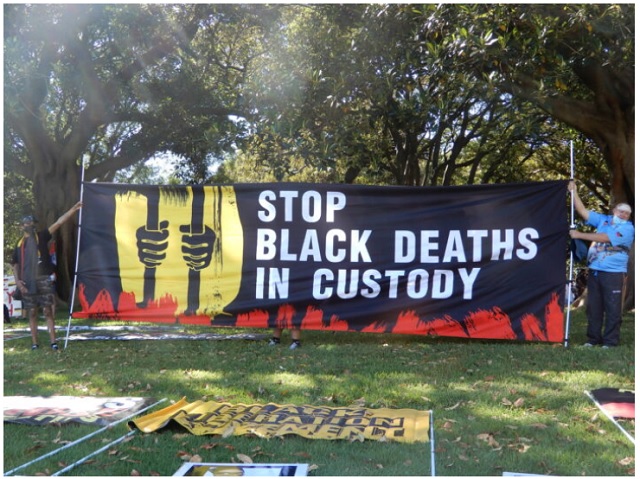The inquest into the custodial deaths of two First Nations teenagers who drowned in Perth's Swan River, as they were being pursued by two WA police officers, on 10 September 2018 came to a close last Friday.
The two officers – one on probation and the other five months out of probation – had been alerted to a group of youths who were allegedly seen jumping fences in the riverside suburb of Maylands, when they stopped at a house where there was evidence of trespass.
Five youths present at the scene made a run for it. The officers decided to pursue them on foot. One of the youths took off in another direction, while the remaining four made their way down to the river in an attempt to get away.
By all accounts, the river was freezing and choppy on the day of the incident. And 16-year-old Christopher Drage and 17-year-old Trisjack Simpson only had the strength to make it halfway through the strong current.
The inquest heard that the officers pursuing the boys stood on the side of the river as they drowned. One of the pair told the court that she was unable to recall that one of the other boys – who'd given up his attempt to cross the river – had been calling on them to assist his struggling friends.
Calls for reform continue |
"Junior officers must not be left alone to make life-and-death decisions," said George Newhouse, director of the National Justice Project: a not-for-profit legal practice that handled the case.
The four boys had to run through mud and debris to make it to the river. A witness to the incident told the inquest that they saw two police officers stop at the bank. Soon after, some tactical response officers, who happened to be nearby, arrived on the scene and attempted rescue.
"To help improve relations with local First Nations communities, senior police officers who know their local community, and who have undergone thorough and meaningful cultural safety and awareness training, must be present while on patrol," Newhouse continued.
The rookie officers told WA coroner Philip Urquhart that they couldn't remember their cultural safety training, and that they hadn't received any training on water rescues.
The sentiment from the inquest was the need for better training and improved relations between police and Aboriginal youth. But the issues surrounding the incident go much further.
"Police need to divert children away from the criminal justice system in accordance with the recommendations of the Royal Commission into Aboriginal Deaths in Custody," Newhouse told Sydney Criminal Lawyers, "and not instil fear or else this tragedy could happen again."

A pathway ignored |
The Royal Commission into Aboriginal Deaths in Custody handed down its final report on 15 April 1991.
The document contained 339 recommendations that provide a clear path to reform, yet most of its suggestions have been ignored, which has seen custodial deaths continue.
The Royal Commission determined that all custodial deaths be the subject of an inquest. And the report defines such deaths as those occurring in police custody, prison custody and juvenile detention, as well as deaths that occur due to traumatic injuries sustained in such settings.
Deaths occurring as a result of being pursued by prison guards or police, as with the Swan River tragedies, are classed as custodial. And fatal injuries sustained in the process of attempting to escape from police, corrections or from youth detention are also considered deaths in custody.
Recommendations 234 through to 245 specifically address Aboriginal youth. They include devising strategies in consultation with Aboriginal communities, enhanced employment and training programs with adequate resourcing, and that cautions should be favoured over arrests.
The report maintains that youths should not be detained in police lockups. And it makes overall recommendations – not only in relation to young people – that both arrest and imprisonment should be sanctions of last resort.
The fear of police |
According to Change the Record, there have now been 458 black deaths in custody since the Royal Commission tabled its report.
Over the last three weeks, four First Nations custodial deaths have transpired. Three of these occurred within the Australian prison system, while the fourth took place as police were pursuing an Aboriginal man in Broken Hill.
Change the Record warned on Tuesday that youth justice reforms in the Northern Territory are going lead the number of Aboriginal children in prison to "skyrocket". Indeed, in mid-2018, every young person detained in the NT youth justice system was a First Nations child.
In December last year, 40 percent of the youths detained in the NSW youth justice system were First Nations young people. However, Aboriginal and Torres Strait Islander young people only account for around 5 percent of people under the age of 18 in this state.
In terms of WA, 69 percent of all imprisoned youths last September were First Nations children.
Aboriginal Legal Services WA chief executive David Eggington told NITV's The Point that he'd seen the Swan River the day that the boys drowned and described it as "a river in turmoil, bubbling and dangerous looking." Christopher's mother told the program he was terrified of swimming.
Yet, three of the boys chose the raging river over police, and only one survived.
The content of this article is intended to provide a general guide to the subject matter. Specialist advice should be sought about your specific circumstances.

